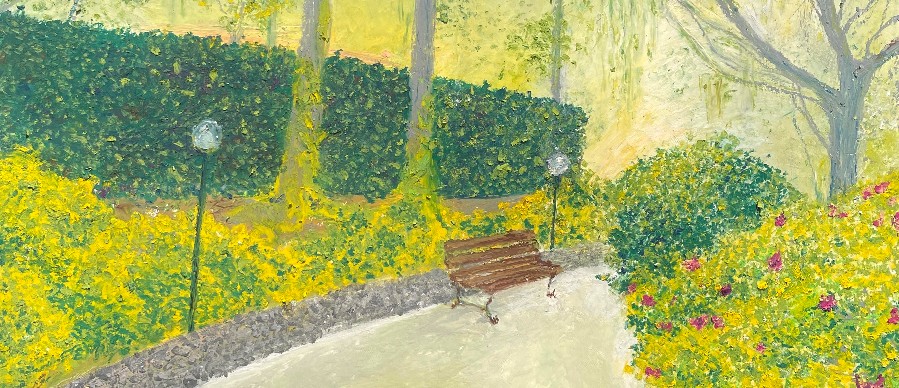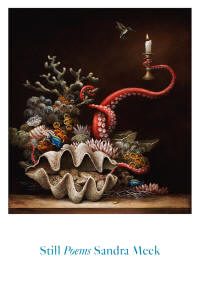
~ Delta Poetry Review ~
Sandra Meek's Book Review by Susan Swartwout
 Still
by Sandra Meek. New York: Persea Books, 2020. Paper; $15.95.
Still
by Sandra Meek. New York: Persea Books, 2020. Paper; $15.95.
Sandra Meek’s compelling sixth book,
Still,
encapsulates beauty and the pain of loss, both impending and actual,
of selected still lives—those ephemeral in their current existence
and those stilled forever. Named a “New & Noteworthy Poetry Book” by
The New York Times Book Review,
Still
offers an intense and challenging sojourn through a museum balanced
on an apocalyptic edge we ignore at our peril, a gorgeous,
far-reaching collection of exhibits prepared for contemporary
readers as well as preserved for the future and its travelers to
sift through after our human age has passed.
Structured like a
studiolo, a
Renaissance-conceived room displaying cabinets of wonder,
Still is
sectioned into four cabinets, each containing five to six poems. In
some poems, the sense of “still” is very much alive, though paused
here for contemplation, such as the “swan that circled the park’s
tiny island, alto / clef of her neck in reflection among the cypress
/ knees” (“Still Life with Dysphonia”) or the squid, who is
“hovering, though you know / what’s coming, still it surprises, how
sudden / the unfurling, the arms flash-flowering to star / anemone”
(“Still Life with Caribbean Reef Squid [Sepioteuthis
sepioidea]”).
Others are poised in an afterlife of stunning
transformation, such as the human-bone chandelier in the Czech
Republic’s
Sedlec Ossuary that casts a “chapel of shadow
fashioned from the body’s // every bone, studded with skulls /
wicked to candlelight” (“Still Life with Flag Trees and Bone
Chandelier”). Or the USS Arizona,
resting yet on seabed in “Pacific waters, dark swarm of planes // on
dawn radar misread / as friendly—”
with its tragically converted world: “biofouling
of the wreck equally composed // of the living and the dead” (“Still
Life with Damnosa Hereditas and Dark Constellations: USS
Arizona and
Llullaillaco Maiden”).
To add power to prediction, warnings come from
unlikely oracles, such as a donkey in “Still, with the Coming
Extinction of the Southern African Donkey,” sold for hide after a
lifetime of work and pain, who prays,
may your choked fields sing
only hunger’s growl, the drummed hollow we so
long
had stomached, docile as we were,
then, before we dared be
the ghosts that now, into the flaming
plumes of dust, always
will bear you.
And in Meek’s final poem of the collection,
“Still Life with Evolution:
Amblyrhynchus cristatus (Marine
Iguana), Fernandina, Galápagos,” warnings are embodied in the living
and the dead and in those waiting at this edge of existence. The
observant speaker gathers evidence of a species at a precarious
stage of evolution, intoning a bleak future. The word “never” echoes
like a death knell at the inception and close of the poem, creating
an envelope into which is tucked the harsh imagery of “wedging to
crooks / between rocks the curved spines, vertebrae puzzled knuckle
/ to knuckle,” the hawk that paralyzes its victim with heat before
ripping it open, human presence—no matter the intent toward benign
and observational—that is as or more deadly in destructive force to
the iguanas’ most dread predator and to climate change.
Following these cabinets of poems filled with
memorabilia, memento mori, and Meek’s breathtaking use of language,
this final, rending poem, “Still Life with Evolution,” encapsulates
the folly of careless stewardship of our planet and those other
small worlds that comprise it, the fatalities when “what sustains,
too long / held, poisons.” While humanity willingly continues its
unsustainable crush of artifice and owning, it expels in its
“breath, the flood and the fire, / rising.” The world in contrast,
“the temperature scaling beyond / the seaweed’s bearing,” collapses
in thrall, leaving stilled and partial traces, perhaps for some
future traveler to discover and puzzle to parse.
Sandra
Meek's Interview
Sandra Meek's
Poems and Bio
| Archive | Submissions | About | News |